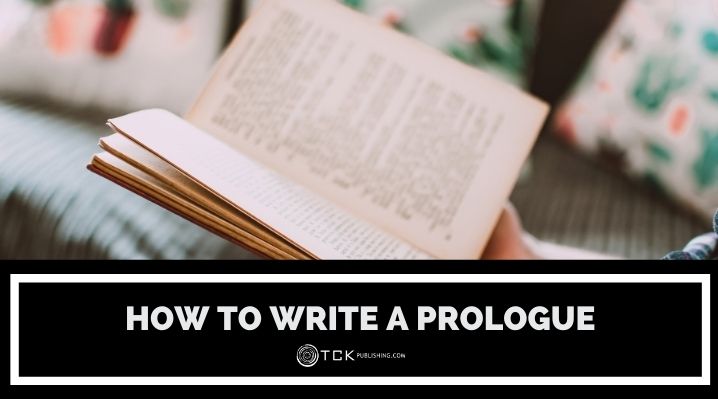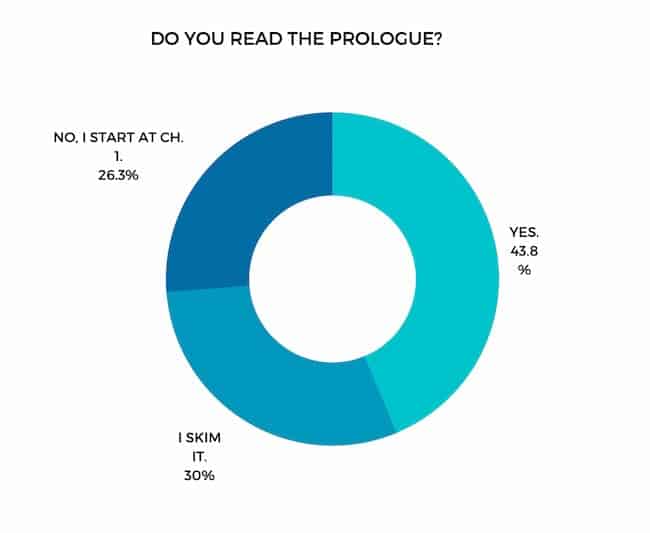
If you’ve decided that your story would benefit from a prologue, you’re probably eager to jump in and start writing.
However, you should give this section as much thought as you would any other chapter in your book. We’ve created this guide to help you make your prologue an essential piece to your narrative.
How to Write a Prologue
Keep these 6 tips in mind when writing a prologue for your novel.
1. Drop hints.
Prologues are helpful for foreshadowing, or offering subtle clues of what’s to come. This could be as subtle and simple as setting the tone and mood with your word choice.
Especially in horror, crime, and thriller novels, the prologue is important for hinting at characters, settings, and mysteries to come.
Even if the prologue is set years or oceans away from the book’s main setting, the relevance of what’s stated there becomes evident as you get deeper into the main story, even if at first it seems totally unrelated.
While setting the prologue in the past is one option, you can also write it from the future, in which case your story will answer the question, “How did we get here?”

2. Only include relevant details.
If you do choose to set your prologue in a different time or place than the main text, make sure that you’re only including relevant details.
The connection to later events does not need to be immediately obvious, but everything in your prologue should serve your story in some way, whether it’s character development, plot advancement, or worldbuilding.
3. Try a different point of view.
Unless the entire premise of your novel is that it’s told from various perspectives, you should avoid changing points of view in the middle of your story (also known as head hopping). Doing this can be very jarring and confusing to your readers.
However, the prologue is one place where you might actually want to explain things from a point of view that’s different from the main narrator’s.
If you think hearing a different POV will help your readers or make a better reading experience, this is the place to give that other character a voice.
But even here, the reason for writing from a different perspective should be evident by the end of the novel. It should have some significance, not just be included because you felt like changing things up.
4. Keep your tone consistent.
While your prologue may feature a different speaker, the overall tone should still be consistent with that of your main story.
For example, if you’re writing a murder mystery, you probably shouldn’t pack your prologue with wit and humor. Focus on building an air of mystery.
5. Don’t just info-dump.
Simply dumping information is a rookie mistake that some writers make in their prologues, or the expositions of their novels.
Yes, you want to set the tone and provide important information to help your readers better understand and appreciate the novel, but you should present this background info in a way that flows and fits with your narrative.
Your prologue should enhance your story, not just explain it like a professor.
6. Don’t substitute the prologue for a strong intro.
The point of a prologue is not to outshine your introduction by fighting to be the most compelling part of your novel.
If you’re going to include a prologue, make sure it fills a purpose of its own; do not think that you can write a great prologue, then skimp on your actual first chapter.
Your introduction and first chapter still need to hook and captivate readers’ attention so they are compelled to keep reading.
Does Your Book Need a Prologue?
As a reader, have you ever found yourself flipping past the prologue, preface, foreword, or other front matter of a book so you can get to “the good stuff”? If so, you’re far from alone.
Our fiction editor surveyed 117 readers and writers, and over 26% said that they skip the prologue entirely, while 30% only skim it. That means that less than half of surveyed readers actually read the full prologue!

One of the most common reasons cited by people who choose to skip the prologue is that these sections often include info dumps. Many respondents also said they believe that skilled writers don’t need a prologue, but rather can work all essential information into the actual story.
One solution to avoid writing a prologue that no one will read is simply labeling your prologue Chapter One instead, or something interesting like, “Ten Years Ago…,””Yesterday,” “March 30th,” or some other time reference.
How Long Is a Prologue?
There is no rule for how long a prologue should be, and the right answer will really come down to the nature of your story.
However, it’s best to keep the prologue on the shorter side (1–5 pages should suffice). Remember: this is an appetizer, not the main course.
Did you find this post helpful? Let us know in the comments below!
If you enjoyed this post, then you might also like:
- What Is a Denouement? How to Tie Up Your Story’s Loose Ends
- How to Start a Story: 6 Creative Ways to Get Up and Writing
- What Is a Preface? How to Introduce Your Book to the World
- Exposition: Definition and Examples from Literature
As a blog writer for TCK Publishing, Kaelyn loves crafting fun and helpful content for writers, readers, and creative minds alike. She has a degree in International Affairs with a minor in Italian Studies, but her true passion has always been writing. Working remotely allows her to do even more of the things she loves, like traveling, cooking, and spending time with her family.

Thank you so much to everyone for these helpful tips! It was super helpful to me and my Illustrator friend that are starting to make a book series. I’ll be sure to use this information for my prologue and add this website page because of all the trouble it helped me skip if I didn’t use it.
Thank you so much Kaelyn! Thanks to you I have an amazing prologue! Again, thank you so much!
-Lester
Thank you so much, Kaelyn Barron! This is super helpful <3
You’re very welcome, Naila! Glad you found the prologue tips helpful :)
Hi Kaelyn Barron,
I found your article very helpful. I have been told that my sci-fi story needs a prologue. I have tried several times to write one but I was not satisfied with it and tried to put the info into the story. That didn’t work well either. Your article will help me structure a decent prologue. Thanks.
I hope the tips help you, Sandra! Let me know if you have any questions :)